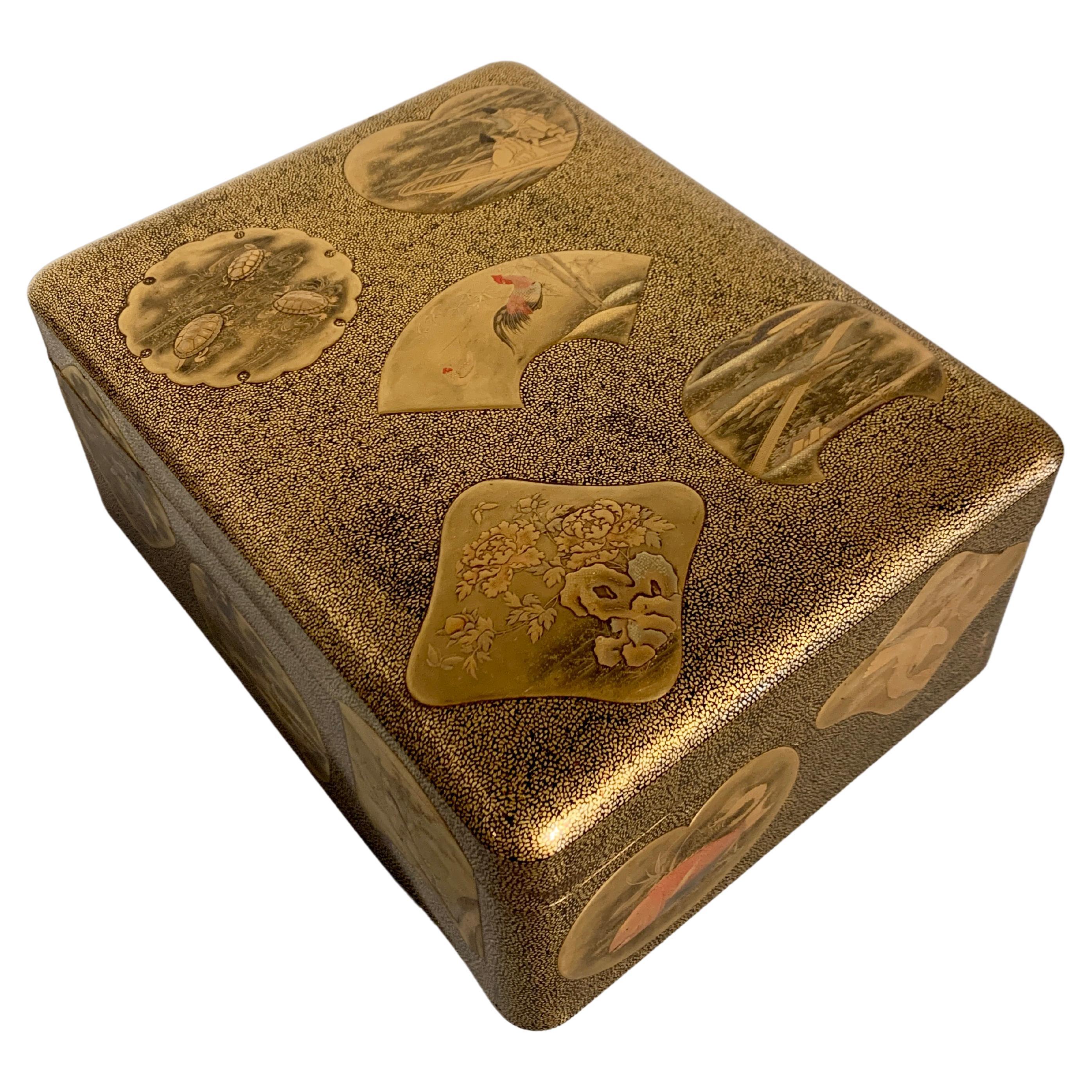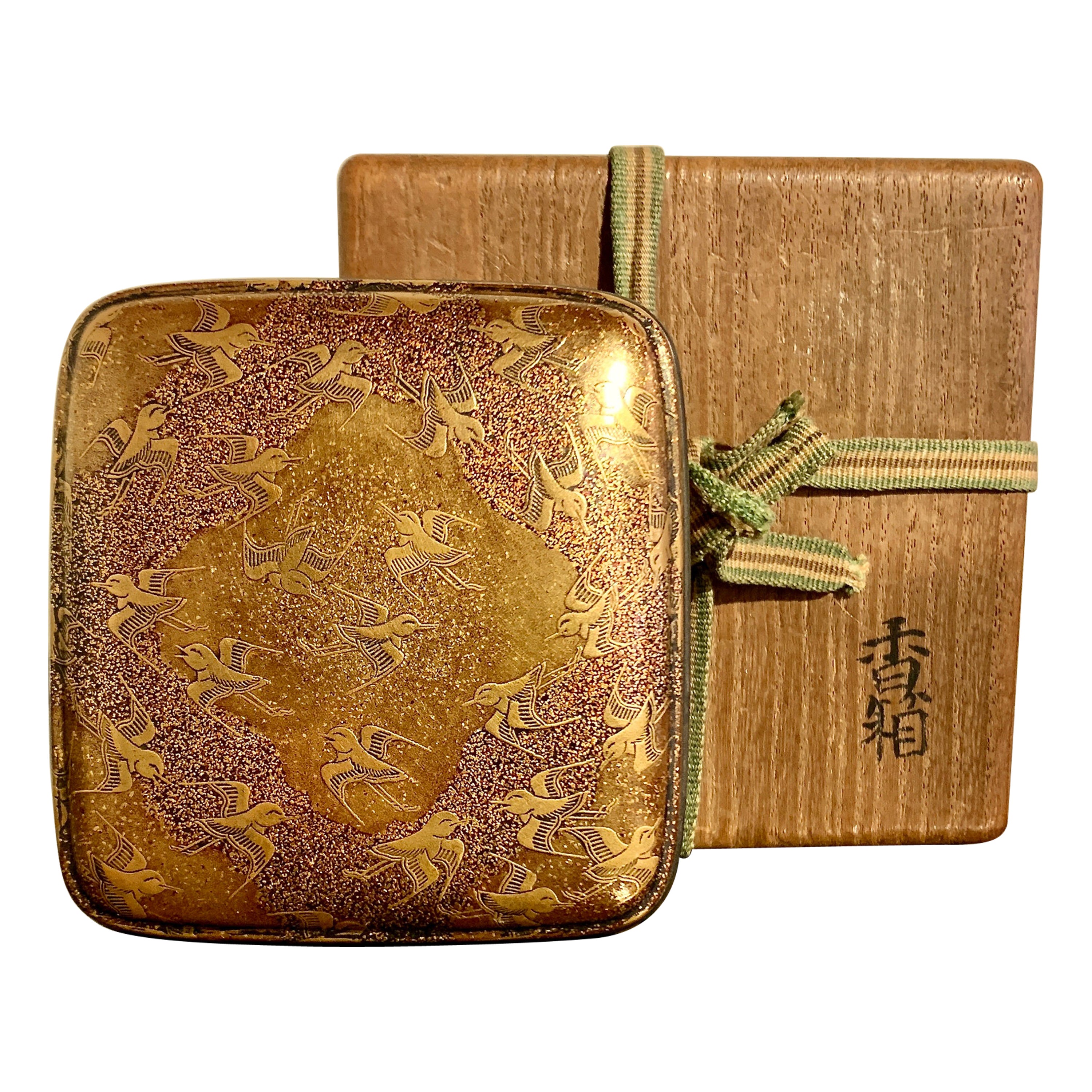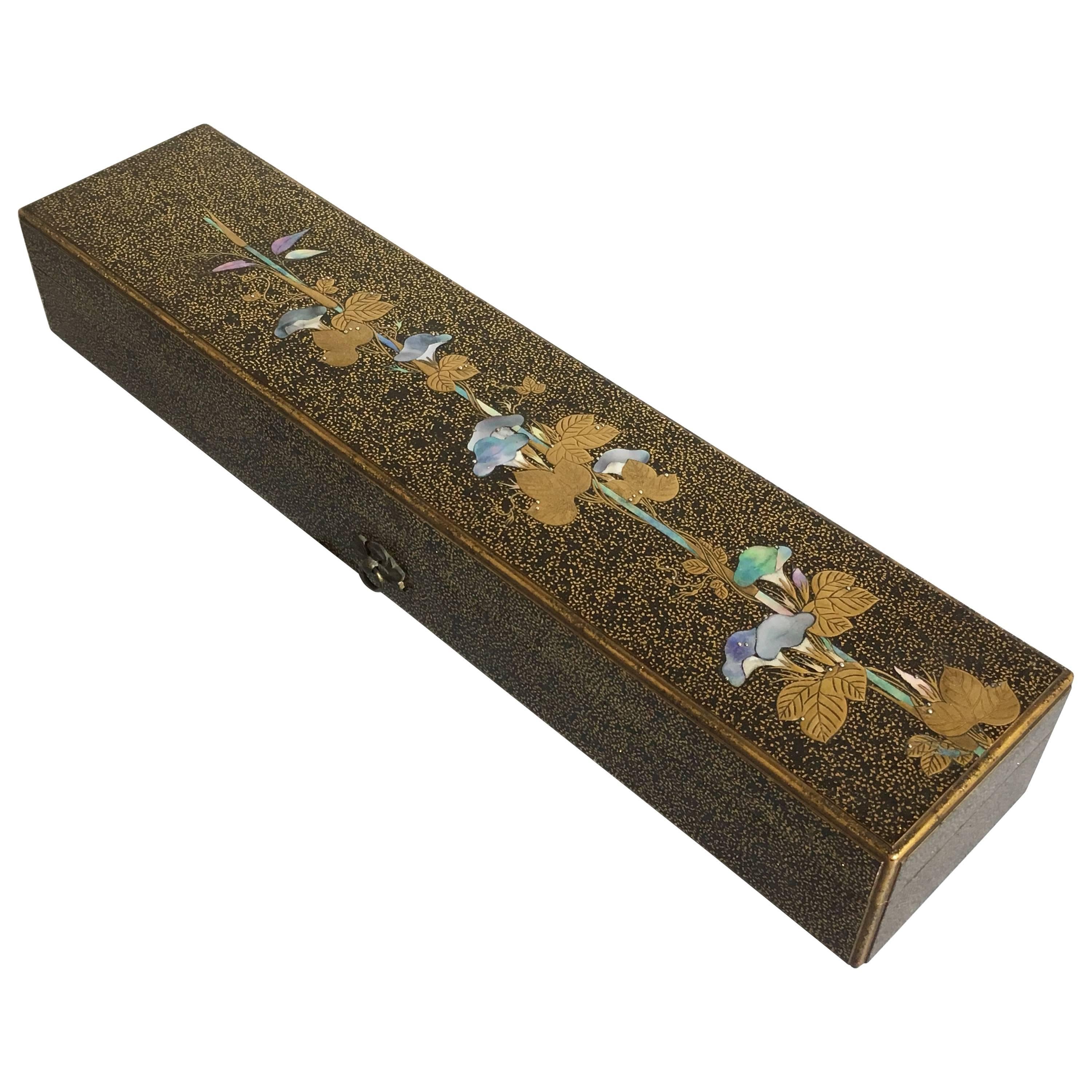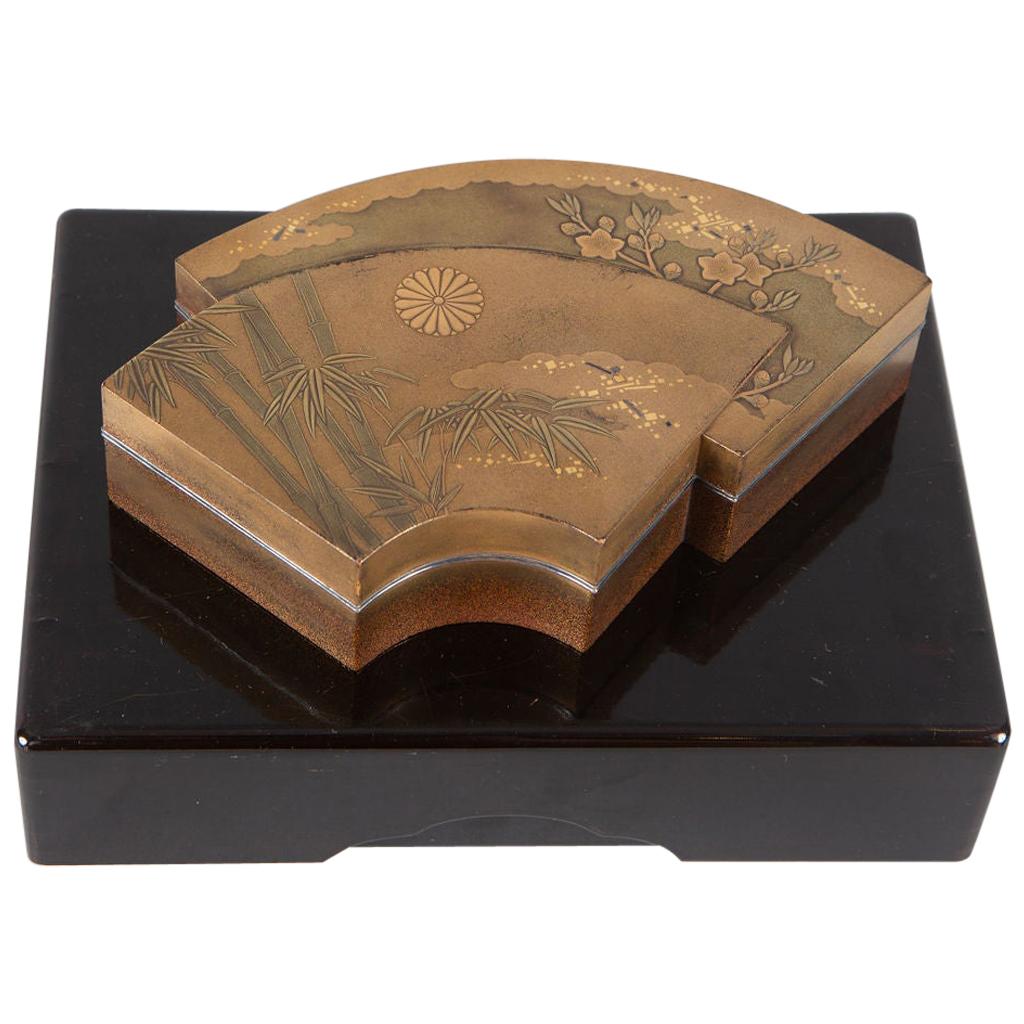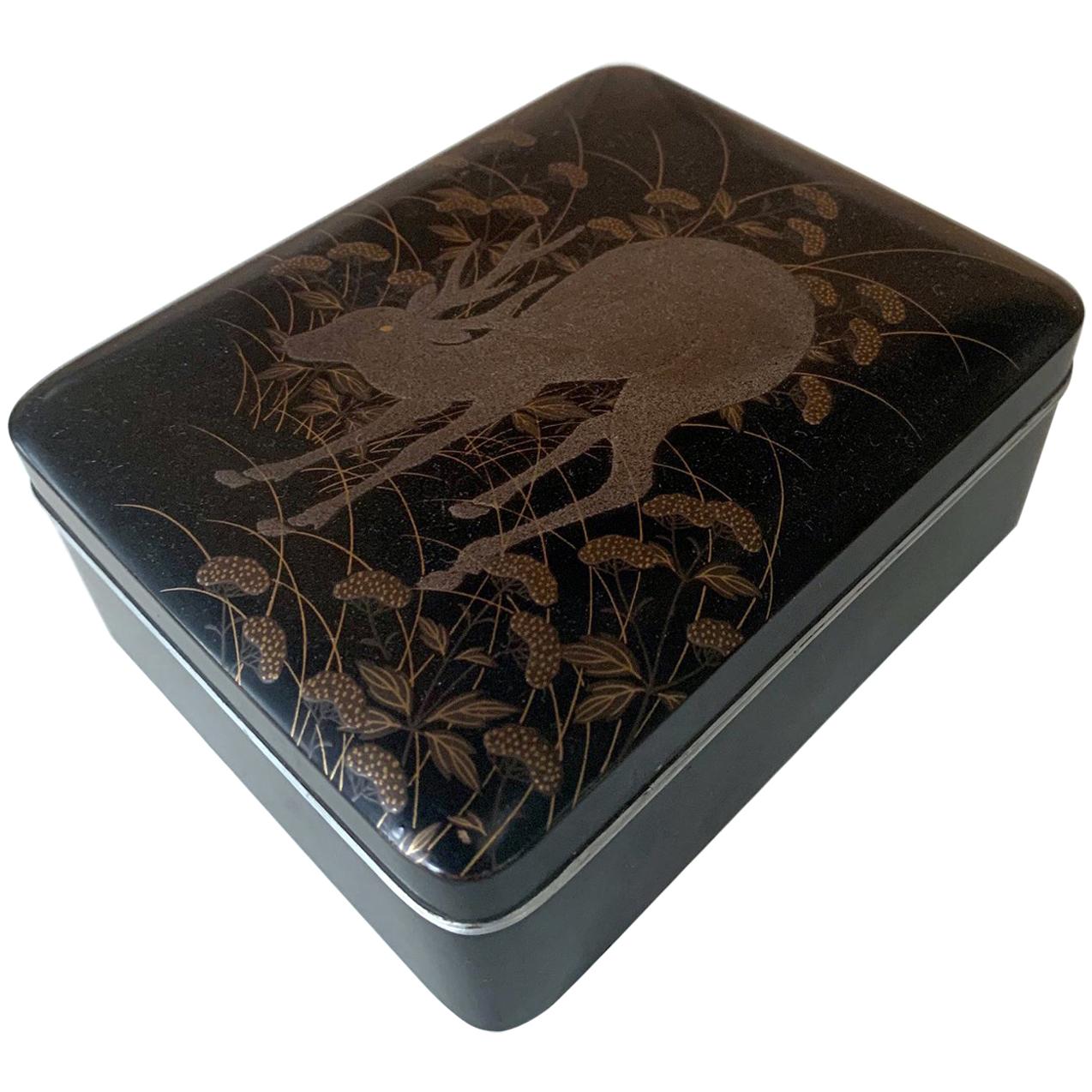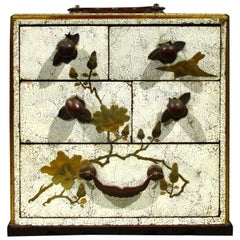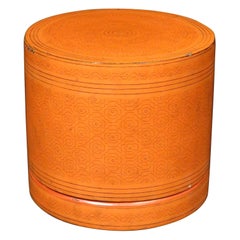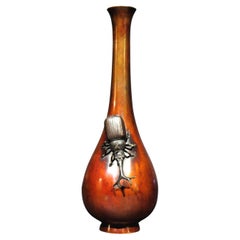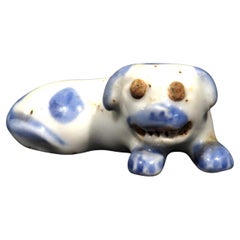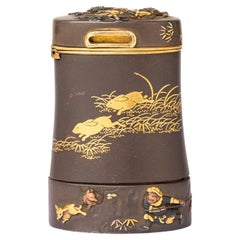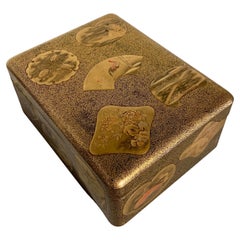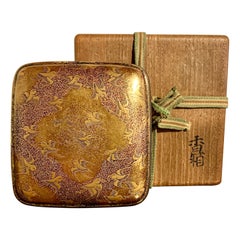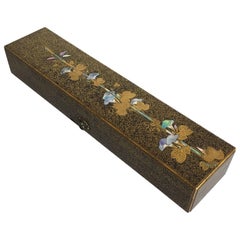Items Similar to A Very Fine Takamaki-e Lacquer Cheroot Case in the Manner of Shibata Zeshin
Want more images or videos?
Request additional images or videos from the seller
1 of 9
A Very Fine Takamaki-e Lacquer Cheroot Case in the Manner of Shibata Zeshin
$3,800
£2,865.22
€3,301.76
CA$5,271.63
A$5,906.83
CHF 3,074.73
MX$72,260.98
NOK 39,028.01
SEK 36,861.48
DKK 24,648.34
Shipping
Retrieving quote...The 1stDibs Promise:
Authenticity Guarantee,
Money-Back Guarantee,
24-Hour Cancellation
About the Item
The 'ishime' lacquered case consisting of two conforming molded sections with one sliding overtop the other, both sides decorated with hand painted gilt, silver & burnt dark russet (kasshoku) lacquers, depicting motifs in low relief of a rat with an acorn on one side and two acorns on the opposing.
In Japanese culture rats are considered auspicious symbols of fertility & wealth, acorns symbolize prosperity & growth. Signed with characters and a mon on one edge.
Takamaki-e is a lacquer technique in which metallic powders such as silver, gold, copper, pewter etc., are used in combination with lacquer & clay-dust to build up motifs in low relief.
Please note that the color tones & hues of the lacquered motifs appear somewhat more vibrant in the images due to ambient lighting conditions.
Regarding the opinion stating the superior quality of this fine example being likened to works associated with those by Shibata Zeshin, this is substantiated in writing by an internationally recognized senior authority on Japanese & Asian works of art, which will be made available to the buyer at the point of purchase).
SHIBATA ZESHIN (1807-1891) was a master lacquer craftsman and is regarded as perhaps the most famous & accomplished lacquer artist of the late Edo / early Meiji Periods, with examples of his work on permanent display at the Metropolitan Museum in New York City and the Victoria & Albert Museum in London.
- Similar to:Shibata Zeshin (Maker)
- Dimensions:Height: 3.75 in (9.53 cm)Width: 2.25 in (5.72 cm)Depth: 0.75 in (1.91 cm)
- Style:Meiji (Of the Period)
- Materials and Techniques:
- Place of Origin:
- Period:
- Date of Manufacture:1870
- Condition:In very good overall condition with minor surface wear consistent with the items age, materials & use.
- Seller Location:Ottawa, CA
- Reference Number:1stDibs: LU2728326217162
About the Seller
5.0
Vetted Professional Seller
Every seller passes strict standards for authenticity and reliability
Established in 1989
1stDibs seller since 2017
129 sales on 1stDibs
Typical response time: 2 hours
- ShippingRetrieving quote...Shipping from: Ottawa, Canada
- Return Policy
Authenticity Guarantee
In the unlikely event there’s an issue with an item’s authenticity, contact us within 1 year for a full refund. DetailsMoney-Back Guarantee
If your item is not as described, is damaged in transit, or does not arrive, contact us within 7 days for a full refund. Details24-Hour Cancellation
You have a 24-hour grace period in which to reconsider your purchase, with no questions asked.Vetted Professional Sellers
Our world-class sellers must adhere to strict standards for service and quality, maintaining the integrity of our listings.Price-Match Guarantee
If you find that a seller listed the same item for a lower price elsewhere, we’ll match it.Trusted Global Delivery
Our best-in-class carrier network provides specialized shipping options worldwide, including custom delivery.More From This Seller
View AllSigned Japanese White Lacquer and Maki-E Lacquer Tansu, Meiji Period
Located in Ottawa, Ontario
The case decorated overall in crackle-glaze white lacquer and fitted with a patinated metal carrying handle over three tiers of small drawers. The first two tiers are comprised of a ...
Category
Antique Late 19th Century Japanese Meiji Lacquer
Materials
Lacquer
Highly Decorative Antique Burmese Lacquered Betel Box / Kun-It, Circa 1900
Located in Ottawa, Ontario
The vermillion lacquered cylindrical body decorated overall with repeating bands of curvilinear geometric motifs, the cover lifting to reveal both of its original trays intended to h...
Category
Early 20th Century Burmese Lacquer
Materials
Lacquer, Bamboo
A Very Fine 19th C. Japanese Bronze 'Kabutomushi' Vase, Meiji Period (1868-1912)
Located in Ottawa, Ontario
A fine & rare Meiji period 'Kabutomushi' bronze vase, exhibiting a fine old surface with an exceptionally fine patina overall, featuring an applied, naturalistically cast & detailed ...
Category
Antique Early 1900s Japanese Meiji Metalwork
Materials
Bronze
A Rare Edo Period Hirado Porcelain Netsuke, Japan Circa 1850
Located in Ottawa, Ontario
The recumbent white porcelain figure of a pug dog shown baring its teeth, decorated by hand with spot painted cobalt detail, the underside with twin holes intended for a cord to pass...
Category
Antique Mid-19th Century Japanese Edo Ceramics
Materials
Porcelain
An Extremely Fine 19th C. Miniature Japanese Mixed Metal Bronze Cylinder Vase
Located in Ottawa, Ontario
The diminutive & finely proportioned cylinder-shaped body illustrating a naturalistic motif of a silvered lily blossom issuing from a leafy stem, decorated with both Shibuichi & Shak...
Category
Antique Late 19th Century Japanese Meiji Metalwork
Materials
Gold, Silver, Bronze, Copper
A Very Fine Japanese Mixed Metal Bronze Suiban / Planter on Stand, Taisho Period
Located in Ottawa, Ontario
A very fine Japanese bronze Suiban (planter) of bellied oval form, richly decorated overall with hand enamelled and 'shibuichi' & 'shakudo' motifs, depicting geometric designs, pine ...
Category
Early 20th Century Japanese Meiji Scholar's Objects
Materials
Bronze
You May Also Like
Antique Japanese Meiji Shakudo Vesta Case By Komai Otojiro
Located in Portland, England
This exquisite Japanese Meiji iron, gold & silver vesta case was made circa 1905 by Komai Otojiro.
(駒井音次郎), the third son of Komai Seibei (駒井清兵衛), a sword fittings maker who establis...
Category
Antique Early 1900s Japanese Boxes and Cases
Materials
Gold, Silver
Large Japanese Lacquer Document Box, Ryoshibako, Edo/Meiji period, Japan
Located in Austin, TX
A large and magnificently decorated Japanese lacquer document box, ryoshibako, signed Umeboshi/Baikyo, late Edo or early Meiji Period, mid 19th century, Japan.
The large document box, ryoshibako, of tall, rectangular shape with rounded corners, and fitted with an inrobuta (flush-fitting) cover with beveled edges. The exterior of this exquisite box is decorated all over with fifteen different raised reserves shaped as uchiwa (paddle) fans against a lush and intricate krikane ground imitating shagreen.
The uchiwa shaped reserves all of takamaki-e, and exquisitely painted with designs of animals, flowers, and landscapes in silver, gold, maki-e, hiramaki-e, and takamaki-e, with kirikane, nashiji, and polychrome embellishments, upon gold lacquer fudame grounds.
The interior of the lid is nothing short of spectacular, featuring a large design of a magnificent and beautifully detailed rooster and hen with chicks gathered around a lazy stream. Large stalks of chrysanthemum bloom behind them. All against an ethereal nashiji ground.
The cover of the box features five reserves:
1. Three minogame (turtles with long tails), symbolizing longevity
2. "Narihira Crossing the Sumida" from The Tales of Ise...
Category
Antique 1860s Japanese Meiji Lacquer
Materials
Softwood, Lacquer
Japanese Lacquer Incense Box, Kogo, Momoyama or Edo Period, 16th/17th Century
Located in Austin, TX
A wonderful Japanese lacquer incense box, kogo, with a design of plovers in flight, late Momoyama or early Edo Period, circa 1600, Japan.
The small box, called a kogo, was used to s...
Category
Antique Early 17th Century Japanese Edo Lacquer
Materials
Gold, Pewter
Japanese Edo Period Igarashi School Long Lacquer Box, Tanzaku-Bako
Located in Austin, TX
A stunning Japanese Edo period lacquer tanzakubako, box for poem cards, late 18th-early 19th century, Edo Period, Japan.
Attributed to the Igarashi School, this box is masterfully ...
Category
Antique Early 19th Century Japanese Edo Lacquer
Materials
Mother-of-Pearl, Lacquer
Japanese Lacquer Kogo 'Incense Box'
Located in Hudson, NY
Late Edo (1614 - 1868) period incense storage box in stacked, double fan design. Fans have bamboo and plum design with a chrysanthemum crest. Silve...
Category
Antique Mid-19th Century Japanese Edo Lacquer
Materials
Gold
Japanese Rinpa Style Lacquer Box Meiji Period
Located in Atlanta, GA
A black lacquer tebako (hand box) with maki-e decoration and silver trim, circa late 19th century, Meiji period. The surface of the lid features a Rinpa style maki-e paint depicting ...
Category
Antique 1890s Japanese Japonisme Lacquer
Materials
Wood, Lacquer
More Ways To Browse
Black Gold Lacquer
Lacquer Display Cases
Black Lacquer Case Display
Japan Edo Lacquer
Asian Display Case
International Pewter
Silver Rat
Antique Craftsman Lighting
Victoria Copper
Pewter Molds
Japanese Rat
Cheroot Case
Shibata Zeshin
Japanese Inlay
Japan Edo Lacquer
Lacquer Fan
Cinnabar Furniture
Mother Of Pearl Inlay Lacquer

